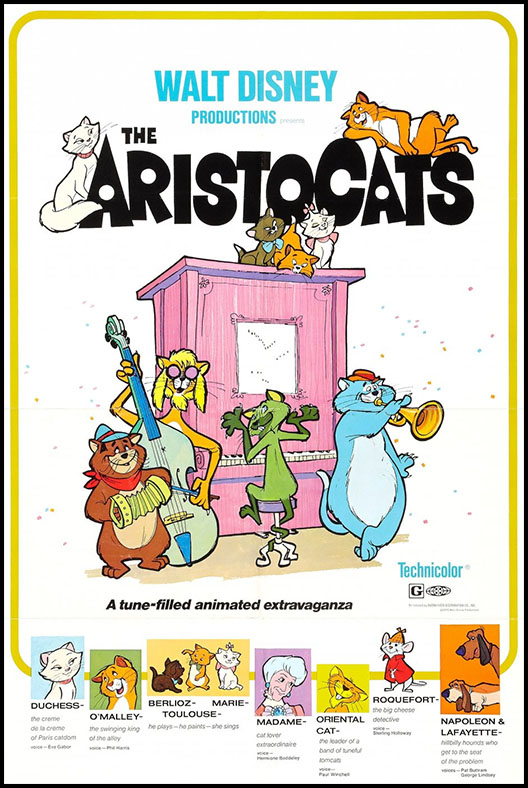Our year of the month is 1970. Here's Tim Brayton...
 From the standpoint of 1970, we find ourselves at the dawn of what is almost certainly the least-interesting decade in the history of American animation. Television screens were then dominated by the flat, cheap nonsense of Hanna-Barbera while Warner Bros. and MGM had abandoned their short film programs. Just about the only person trying to do anything with the medium was Ralph Bakshi, whose vulgar cartoons for adults were very often "fascinating," but almost never "good." The problem, in all likelihood, is that for 40 years, American animation had been primarily a matter of people reacting to the things Walt Disney had done; and in 1970, Walt Disney had been dead for four years.
From the standpoint of 1970, we find ourselves at the dawn of what is almost certainly the least-interesting decade in the history of American animation. Television screens were then dominated by the flat, cheap nonsense of Hanna-Barbera while Warner Bros. and MGM had abandoned their short film programs. Just about the only person trying to do anything with the medium was Ralph Bakshi, whose vulgar cartoons for adults were very often "fascinating," but almost never "good." The problem, in all likelihood, is that for 40 years, American animation had been primarily a matter of people reacting to the things Walt Disney had done; and in 1970, Walt Disney had been dead for four years.
This left his namesake studio in a state of full panic and confusion, looking to find any sort of project that felt like it might be "what Walt would have done." The first of these, released for Christmas, was The Aristocats, based on the last story (by Tom McGowan & Tom Rowe) that Walt had briefly glanced at and given his vague blessing to before his death...

Beyond that, this was the studio's very first project produced entirely without Walt's guidance, and so deserves to be considered as the harbinger for all the things to follow for a decade and a half.
There is no such thing as a Disney animated feature that has absolutely no fanbase whatsoever, and The Aristocats has its share of partisans. It was a good-sized hit in 1970, and in years since, it has benefitted from how successfully Disney has marketed toys and clothes based on the three kittens at the heart of the story. Who doesn't love a kitten, especially an adorable animated kitten with a little pink hair bow and eyes the size of serving platters?

Granting that, I'll admit right up front that The Aristocats is a film that I've never once warmed to. It's a strange, immediately off-putting story of a jealous butler to a Parisian society matron who, upon learning that her beloved cats are to be the sole heirs to her estate, sets off to abandon them in the French countryside. There, pampered mama cat Duchess (voiced by Eva Gabor) and her three kittens make their way back to the city, with help from jazz-loving alley cat Thomas O'Malley (Phil Harris). And pay no mind to the presence of a jazz-loving creature of any species in late Belle Époque France; the filmmakers didn't.
This is annoying not just for the anachronism – real-world music trends have never been an overriding concern of Disney musicals – but what that phrase "jazz-loving" does for The Aristocats. It is desperately, sadly obvious how much of the film operates in the shadow of 1967's The Jungle Book, not least given Harris's repeat performance of a veritable clone of his Baloo the bear. That includes a shrill, strident desire to be jazzy and "hip," which mostly reveals how incredibly far from anything "hip" the Disney artists were in 1970.
Even if we charitably overlook that, the injections of '60s lounge culture in the form of Harris and the film's signature song "Ev'rybody Wants to Be a Cat" don't fit at all well with the simple, kiddie-flick adventure-comedy that the film otherwise devotes its time to. The whole thing is tonally incoherent and narratively shallow. Furthermore the butler is the least-threatening villain in all of Disney. It's just a frivolous little family-friendly romance set against a tour of the indifferently-drawn French countryside.

That's maybe the most galling thing: this is a terribly unimpressive piece of animation. Starting in the 1960s, Disney abandoned its lush, lavish visuals for a xerography-based aesthetic that created a distinctively rough, penciled-in look, one that showcases the animators' drafting skills more than effective character performance. Sometimes, in fairness, it turned out pretty well:101 Dalmatians, from 1961, is beautiful, and The Aristocats openly borrows from that film's style. More often, and particularly in the 1970s, it left the films looking sketchy and half-formed, and this was an especially big problem for The Aristocats. The cats' human owner Madam is a dreadful tangle of thick, angular lines loosely assembling her face; nothing else in the film is that much of a problem, but it never looks very good.
There is no happy ending to this story: The Aristocats is indifferently plotted, ugly, not much fun to watch, and I forgot to mention, "Ev'rybody Wants to Be a Cat" is also full to the brim with lazy stereotypes of Italians, Russians, Brits, and a particularly appalling Chinese cat, made all the more upsetting because he's voiced by the great voice actor Paul Winchell. And it set Disney in a track it would remain stuck in for years. It's inauspicious as the start to a particular era in American animation, and I am sorry to say that the era would not generally rise very high above this level.
